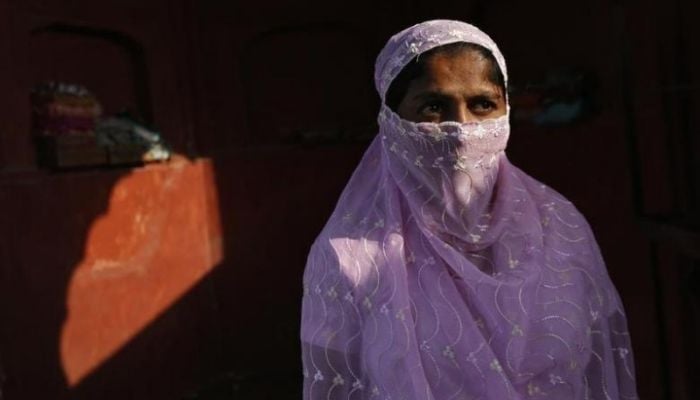Bulli Bai: 100 Muslim women including Malala listed on Indian app for ‘auction’
Photographs of around 100 Muslim women, including Malala Yousufzai, were posted on app for auction as "Bulli Bai" of day
January 03, 2022

- Photographs of around 100 Muslim women were posted on the app for auction as "Bulli Bai" of the day.
- Malala Yousafzai, a Pakistani Nobel Laureate, is also among the women who are listed for "auction" on the app.
- "Bulli Bai" is the second such attempt in less than a year, following the "Sulli Deals" in July last year.
NEW DELHI: A journalist from Indian Illegally Occupied Jammu and Kashmir (IIOJ&K), Quratulain Rehbar, woke up on January 1 to find herself on an "online sale" list.
Her photo was taken without her knowledge and posted on an app for "sale."
She was not alone.
Photographs of around 100 Muslim women, including notable actress Shabana Azami, the wife of a sitting Delhi High Court judge, as well as journalists, activists, and politicians, were posted on the app for auction as "Bulli Bai" of the day.
The perpetrators did not even spare Malala Yousafzai, a Pakistani Nobel Laureate.
"Bulli Bai" was the second such attempt in less than a year, following the "Sulli Deals" in July, in which almost 80 Muslim women were "for sale."
"In local slang, both 'Bulli' and 'Sulli' are disparaging terms for Muslim women.
"However, the Punjabi language was used alongside English in the 'Bulli Bai' interface this time," journalist Mohammad Zubair of fact-checking website AltNews told Al Jazeera.
Rehbar, who covered the "Sulli Deals" auction in July of last year, told Al Jazeera she was taken aback when she saw her photo on the app.
"When I saw my photograph, my throat got heavy, I had goosebumps on my arms, and I was numb."
She described the experience as "shocking and embarrassing."
While there was no actual sale, the internet application – which was created on Microsoft's free software development site GitHub – was designed to "degrade and humiliate vocal Muslim women," according to Rehbar.
The app was taken down on Saturday when users reported that the GitHub extension for "Bulli Bai" looked suspiciously like the one used by "Sulli Deals."
After seeing their photos and information on the app, scores of other Muslim women began voicing their astonishment and fury on social media by Saturday evening.
Ismat Ara, a New Delhi-based journalist, was one of them.
On Saturday, Ismat filed a complaint with the Delhi Police against "unknown people" on social media for harassing and abusing Muslim women "by utilising doctored pictures in an improper and filthy manner."
On Sunday, Delhi Cyber Police filed a First Information Report (FIR) based on her complaint, invoking different provisions of the Indian Penal Code that deal with fostering religious hostility, threatening national integration, and sexual harassment of women.
Ismat also shared a tweet saying "I am not the only one being targeted in this new version of #sullideals. Screenshot sent by a friend this morning."
A police case was also filed in India's financial capital Mumbai against multiple Twitter handles and the "Bulli Bai" app makers after another complaint by Sidrah, whose photo was also featured on the app.
On the other hand, Ismat is pessimistic about the police investigation, citing the fact that no arrests have been made in the "Sulli Deals" inquiry after six months.
Last year, Fatima Zohra Khan, a Mumbai lawyer whose name appeared in both the "Sulli" and "Bulli Bai" deals, filed a complaint with Mumbai police.
"Despite Mumbai Police demanding data from Twitter, GitHub, and Go-Daddy (web hosting firm), we received no response."
"Unless a court warrant is produced, these websites refuse to divulge information," she told Al Jazeera.
Officials from the New Delhi and Mumbai police departments did not react to Al Jazeera's inquiries about the current "auction."
"It's horrible to watch how these anti-Muslim bigots are free to target Muslim women without fear."
Ismat explained, "This isn't the first time an auction like this has taken place."
"The women who have been targeted are outspoken on social media about Muslim problems.
It's a blatant plot to silence these Muslim women because we criticise the Hindu right-hate wing's crimes online," she continued.
Last year, a YouTube channel called "Liberal Doge" posted photographs of Pakistani women in a sexualized film dubbed "Eid Special" during Eid al-Fitr.
After public anger, the firm deleted it.
Muslim women were "auctioned" on Twitter weeks after the incident using the hashtag "Sulli Deals."
Priyanka Chaturvedi, an Indian MP from the western state of Maharashtra, which includes Mumbai, has discussed the issue with the government.
Following her tweet urging India's IT minister to take "severe action" against "misogynistic and communal targeting of women," the minister announced that GitHub has disabled the site's host and that "police authorities are coordinating additional action."
"Police complaints were filed during the 'Sulli Deals' period. However, nothing was done.
That is why these perpetrators are feeling confident, " Chaturvedi told Al Jazeera.
Rehbar said it is "especially troubling" for Muslim women who are "against patriarchy and constraints" while also "facing such harassment."
"Women are frequently asked to delete their photos from social media and keep them hidden.
Many women may find it difficult to take a stand after such harassment of Muslim women. "
People are "hailing targeted harassment of women without being identified by law," according to Rana Ayyub, a Washington Post journalist stationed in Mumbai.
"'Bulli Bai' takes hate crimes in India to a new dangerous level," she continued, "where Muslim women are virtually assaulted and turned into a free-for-all for a bigoted mob."
"These auctions of women from the minority communities display the moral degradation of India and its constitutional values."











